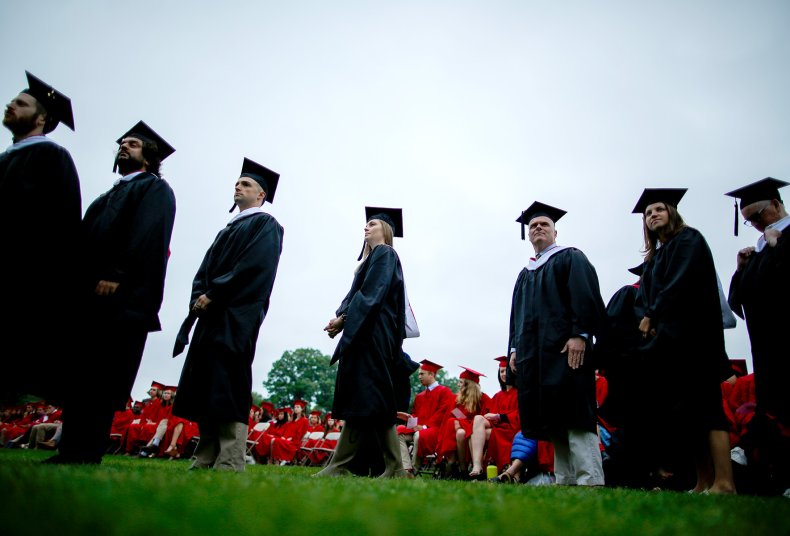Wesleyan University is the latest institution of higher education to ditch legacy admissions in wake of the U.S. Supreme Court's recent affirmative action decision.
The court's ruling came after conservative nonprofit organization Students For Fair Admissions sued Harvard University and the University of North Carolina Chapel Hill, arguing that affirmative action encouraged more discrimination in admissions practices while potentially stunting more qualified individuals from getting to step on campus.
The decision, although cheered by some, led to a renewed focus on legacy admissions—including at Harvard, which this month was sued by Boston-based attorneys on behalf of Black and Latino students, claiming that the Ivy League institution's admissions system violated Title XI of the Civil Rights Act.
Wesleyan President Michael Roth said in a statement Wednesday that while legacy status has long played a "negligible" role in university admissions over the years, he found it important to formally end the process after the Supreme Court's ruling.

"By cultivating free speech, mutual respect and values of inclusion, we seek to foster a sense of belonging for everyone on campus," Roth said. "By recruiting students, faculty and staff with diverse life experiences, attributes and points of view, we continue to build a diverse, energetic learning environment comprised of people who think critically and creatively and who value independence of mind and generosity of spirit."
The university "has never fixated on a checked box" based on race or familial connections, he added, saying Wesleyan will continue to admit students based on criteria including high school records, college essays, letters of recommendation and community impact.
Wesleyan, a private liberal arts college in Middletown, Connecticut, has about 3,600 students, and tuition and fees for first-year students is about $85,000.
Newsweek reached out to Wesleyan via email for additional comment.
Adam Nguyen, founder and CEO of strategy admissions advisory firm Ivy Link, told Newsweek that Wesleyan's legacy admissions were already low compared to Ivy League institutions and that the decision is more symbolic.
Ivy Link works with prospective college students and their families who in most cases have high net worth, navigating the admissions process for individuals from all races and backgrounds so they can attend elite universities.
"I've attended a lot of alumni events where these things were discussed," said Nguyen, who attended Columbia University and Harvard Law School. "This has been in the works for a long time, and the writing has been on the wall. By that, I mean colleges recognize that it is not a good appearance in a democratic society."
There is an argument to be made for alumni loyalty and engagement, he said, notably with donations. He foresees donor legacies possessing more clout in the future than they may already have now, depending on the institution.
"It comes down to money. That's the benefit," he said. "The negative side is that it smacks of inequity and unfairness, especially in this society that we're trying to create in universities, especially elite universities, are supposed to take the lead in creating a better society, including a more equitable society.
"And so it's always been a point of tension within universities within places like Columbia and Harvard, but the money argument has always won out."
Wesleyan follows in the footsteps of institutions including the Massachusetts Institute of Technology (MIT), Amherst College and the private Johns Hopkins University.
MIT has refrained from the practice for many years, saying it follows no quotas based on school, states or regions in addition to legacy/alumni relations.
"Selection is based on outstanding academic achievement as well as a strong match between the applicant and the Institute," the school states.
Among MIT's Class of 2026 freshmen, 1,136 students were admitted and enrolled out of 33,767 applications received from all 50 states. Nearly one in five of those admitted are first-generation college enrollees, while about 11 percent represent 63 countries.
Following the Supreme Court decision, Johns Hopkins President Ronald J. Daniels ridiculed the decision and called it a setback for forging a diverse university community.
"We know that a diverse student body enriches the educational experience and better equips our students to assume the responsibilities of citizenship," Daniels said. "There is no doubt that the success we have enjoyed in ensuring full participation of underrepresented students is jeopardized by this decision."
In October 2021, Amherst announced it was getting rid of legacy admissions.
"Now is the time to end this historic program that inadvertently limits educational opportunity by granting a preference to those whose parents are graduates of the College," Amherst President Biddy Martin said in 2021. "We want to create as much opportunity for as many academically talented young people as possible, regardless of financial background or legacy status."
This year, about 6 percent of students enrolled at Amherst will have legacy connections—down from an average 11 percent in past years, according to Inside Higher Ed. That includes 19 percent of students who are the first in their families to go to college, a school record.
Update 07/24/23, 10:50 a.m. ET: This story was updated to correct a quote by Adam Nguyen.








